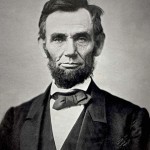If a culture needs healing, more than politics will be required.
A Nation Divided in Culture
These fifty United States have become two nations sharing one geography. We inhabit the same land, but embrace divided cultures and moral visions. And a divided nation will not stand.
In one of his most famous speeches – A House Divided – then-senatorial nominee Abraham Lincoln spoke prophetically:
 A house divided against itself cannot stand. I believe this government cannot endure, permanently, half slave and half free. I do not expect the Union be dissolved — I do not expect the house to fall — but I do expect it will cease to be divided. It will become all one thing or all the other. Either the opponents of slavery will arrest the further spread of it, and place it where the public mind shall rest in the belief that it is in the course of ultimate extinction; or its advocates will push it forward, till it shall become lawful in all the States, old as well as new — North as well as South.
A house divided against itself cannot stand. I believe this government cannot endure, permanently, half slave and half free. I do not expect the Union be dissolved — I do not expect the house to fall — but I do expect it will cease to be divided. It will become all one thing or all the other. Either the opponents of slavery will arrest the further spread of it, and place it where the public mind shall rest in the belief that it is in the course of ultimate extinction; or its advocates will push it forward, till it shall become lawful in all the States, old as well as new — North as well as South.
Lincoln was inspired by the words of Jesus Christ, “Every kingdom divided against itself will be ruined, and every city or household divided against itself will not stand” (Matt 12:25).
Two moral visions in the mid-19th century–slavery for some vs. freedom for all—were incompatible. In the early 21st century, two moral visions—the founders’ dream of free, self-governing people vs. the tyranny of statism—are no less incompatible. One will die; only one can live. Will the Judeo-Christian worldview and political philosophy be restored? Or has the post-Christian atheistic framework won the soul of America?
At stake is freedom itself.
The Issue Is Culture, Not Politics
The 1992 Clinton campaign slogan “It’s the economy, stupid” could still apply. Twenty years later, the economy was still at issue. Consider the record unemployment, debt levels to rival those of Greece, and 4.3 milllion people on welfare. But America did not vote the economy. We voted culture. America voted a moral vision.
 The issue is not political; it’s culture.
The issue is not political; it’s culture.
Professor and theologian Henry van Til has described culture as “… religion externalized.” Politics and economics are downstream from culture. And culture is downstream from cult, another word for worship. Today’s political turmoil stems from the deeper level of a people’s faith. The proselytes of atheism face off against the proponents of Biblical theism. Who will win?
As worship shifts—from the Creator to the State or to Man—culture shifts. As a culture shifts so do its policies and institutions.
Some 20 percent of all American adults identify themselves as “religiously unaffiliated.” This represents an increase among all adults from 15 to 20 percent in the last five years. It is the highest percentage ever recorded.[1]
The political and policy shift evident in the 2012 election has followed a paradigm developing over 120 years. It began when the Judeo-Christian worldview was abandoned in favor of Darwinism. The church followed suit, denying the Judeo-Christian worldview for a dualistic worldview, the sacred-secular dichotomy. As Western culture shifted to atheism and the church disengaged from culture, the ground began to move. The 2012 election comprised the logical conclusion. The very ground has shifted beneath our feet.
What is different about these two visions, the (founders’) Biblical worldview and the (modern statists’) atheistic worldview?
In one, God exists and is sovereign over all of life. In the other, the state is sovereign over all of life. The first affirms freedom, the second devolves into statism. America was founded in the belief that humans are both independent and responsible agents under God. Today’s statists reject individual responsibility. They would make citizens dependent on the state. Note the real connection between God’s existence and human freedom.
One vision believes humans are made in God’s image and “endowed by their Creator with certain unalienable rights.” The other worldview concedes no intrinsic rights. Humans are consuming animals, or statistics. Rights are granted by the state and can be taken away by the state.
One view holds to absolute truth, the other to moral and metaphysical relativism. In the first, justice (established by the rule of law) delivers equality before the law. The other regards justice as equal economic outcomes. The first seeks to solve poverty by the creation of wealth; the other insists on the redistribution of wealth, by force if necessary.
The Founders of the United States built the grand experiment of a Constitutional Republic on a biblical worldview. When the nation abandons that worldview the Constitution no longer has the power to restrain its citizens.
 Speaking on October 11, 1798, John Adams, second President of the United States, revealed the mindset of the founding fathers.
Speaking on October 11, 1798, John Adams, second President of the United States, revealed the mindset of the founding fathers.
We have no government armed with power capable of contending with human passions unbridled by morality and religion. Avarice, ambition, revenge, or gallantry, would break the strongest cords of our Constitution as a whale goes through a net. Our Constitution was made only for a moral and religious people. It is wholly inadequate to the government of any other” [emphasis added].
Nations become free through the self-government of their citizens. The United States Constitution was designed with the Biblical worldview for self-governing citizens. As citizens become more self-indulgent, lawless, and irresponsible, the constitution will cease to function.
The problems of the nation are cultural and not political, the solutions are not political.
– Darrow Miller






4 Comments
Christian Overman
December 10, 2012 - 9:43 amSo true! Well stated. We must get to the root of the matter. Thanks for helping us get to the root of the matter, Darrow.
Mike Soderling
December 10, 2012 - 1:43 pmAnother great posting that once again hits the nail on the head. I might argue that the fundamental difference between the religion of man vs that of our Judeo Christian heritage (religion is defined as: a specific fundamental set of beliefs and practices generally agreed upon by a number of persons or sects and so equally applies to secular/humnists: see the Humaist Manifesto) is that of the belief about the basic nature of man. I believe the majority of folks sitting in the seats in church on Sundays are essentially secular humanists, believing that man’s basic nature is actually good an not evil as has been traditionally taught as a most basic doctrine of the church.
Jon
December 13, 2012 - 12:51 amShared. 🙂